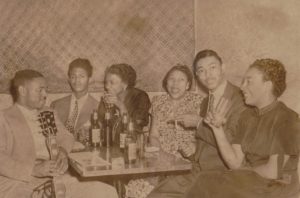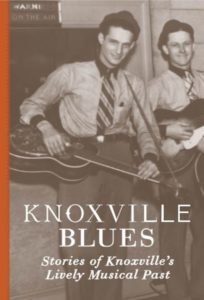Music
Across the broad world–in some minds, at least–Knoxville may be better known for one thing than for collegiate athletics or flowering trees. The city has a pretty fascinating association with a variety of forms of music that connect it with other regions, and other nations. Of course, the city may seem most associated with one particular sort of music known as Country, and its subset Bluegrass, and that makes an interesting story, especially if you take it all the way back to 1883, as we are prone to do.
However, there’s a good deal more, concerning classical music and the development of the Knoxville Symphony Orchestra, which has a more than plausible claim to be the oldest continuously operating symphony orchestra in the South, and its forerunners among the German immigrants who settled here in the mid-19th century–as well as blues, jazz, and rock ‘n’ roll.

Brownie McGhee (far left) and Granville “Stick” McGhee and friends. (Tennessee Archive of Moving Image and Sound)
The history of rock ‘n’ roll is a relatively new study, especially in Knoxville, but it’s a relevant study, since Knoxville has associations with the early development of international rock pioneers like Stick McGhee and the Everly Brothers.
The dawn of rock in Knoxville comes with an interesting irony. Knoxville’s black population accounts for less than 20 percent of the city’s total, and that hasn’t changed much for about a century. However, during the critical decade of the 1950s, Knoxville seems to have enjoyed much better exposure to groundbreaking black popular music than white popular music. During that decade, Little Richard, Bo Diddley, Chuck Berry, Fats Domino, Big Mama Thornton and many others played well-advertised concerts in Knoxville.
But Elvis, Buddy Holly, and numerous other prominent white rockers never showed up here in those early days when they were on the cutting edge. Even the Everly Brothers, who lived here and developed their brother harmonies on live Knoxville radio, didn’t played a public auditorium concert here until long after their heyday. That anomaly may in large part reflect an odd inversion of accommodations in those segregated days–in the ’50s, blacks were accustomed to attending shows at Chilhowee Park, mostly at the Jacob Building–while whites were still waiting for the city to build a mainstream auditorium and, in the meantime, relying on the university’s accommodations (and standards for entertainment, which did not include rock). They were also still waiting for well-connected and open-minded promoters to book shows.
Knoxville encountered rock ‘n’ roll at a place rarely notable for live music in the last half-century, the Jacob Building at Chilhowee Park. As it happens, several of these stories are about auditoriums, like the WNOX auditorium, built to be a techno-cultural landmark and a permanent mecca for country music, but which was soon almost forgotten, and which vanished just as we were learning the fullness of its story–and the Civic Auditorium and Coliseum, which had an amazing career as a showcase for the most famous and influential performers in the free world.
 Lately, Knoxville is becoming well known for an extraordinary annual festival that showcases music so new that big-city critics and scholars haven’t experienced it yet. Big Ears has brought Knoxville more international acclaim than any other event or institution of recent years. But it does have a precedent, of sorts, in another century. It’s part of Knoxville’s music history, too.
Lately, Knoxville is becoming well known for an extraordinary annual festival that showcases music so new that big-city critics and scholars haven’t experienced it yet. Big Ears has brought Knoxville more international acclaim than any other event or institution of recent years. But it does have a precedent, of sorts, in another century. It’s part of Knoxville’s music history, too.
These stories touch on those and a few other aspects of our home town. They’re all stories we’ve researched and written recently, mostly updated and repolished columns and KHP pages that appeared in the Knoxville Mercury from 2015-2017. A comprehensive history of music in Knoxville is a significant project that KHP hopes to be able to produce someday. In the meantime, this compilation “KNOXVILLE BLUES: Stories from Knoxville’s Lively Musical Past” is available in our online store.
In addition, please enjoy the following historical podcasts, stories, and lectures:
Related Podcasts:
Related Stories:
‘The Life of Rock ‘N’ Roll Pioneer “Stick” McGhee
Jazz Piano Genius James Booker’s Mysterious Knoxville Concert
Chilhowee’s Jacob Building: Where Knoxville Discovered Rock ‘N’ Roll
Related Lectures:






